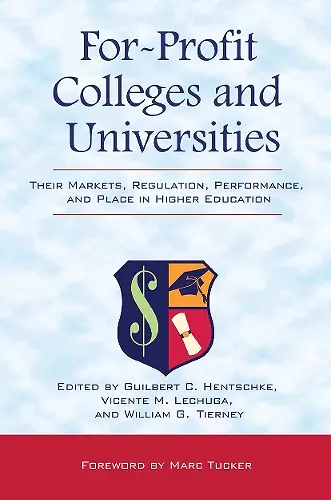For-Profit Colleges and Universities
Their Markets, Regulation, Performance, and Place in Higher Education
William G Tierney editor Guilbert C Hentschke editor Vicente M Lechuga editor
Format:Paperback
Publisher:Taylor & Francis Inc
Published:20th Jan '10
Currently unavailable, and unfortunately no date known when it will be back

Do for-profit colleges and universities (FPCUs) pose a threat to traditional providers of higher education, or do they play a vital role at a time when the capacity of public and private non-profits to meet demand is constrained? With the US no longer the leader in developing a college-educated workforce, can FPCUs help redress the competitive gap? What can be learned from the management practices and growth of FPCUs – that now number close to 3,000 institutions in the US – whose increase in enrollments has out-paced that of traditional institutions, and who now grant around 8% of all degrees? This book offers a clear-eyed and balanced analysis of for-profit colleges and universities, reviewing their history, business strategies, and management practices; setting them in the context of marketplace conditions, the framework of public policy and government regulations; and viewing them in the light of the public good.Individual chapters variously explore FPCU’s governance, how they develop courses and programs, and the way they define faculty work; present findings from in-depth interviews with part-time and full-time faculty to understand how external forces and the imperative of profit generation affect faculty roles and responsibilities of faculty; analyze policy considerations that affect FPCUs, including federal regulation and oversight, accountability and assessment, and the legal and regulatory issues FPCUs face internationally; and finally address the notion of academic freedom and the distribution of public monies to FPCUs. Looking beyond FPCUs’ current strategy of offering career programming to non-traditional students, the book reveals how they are positioning themselves to meet future market needs by developing new programs targeting a wider group of students.Recognizing that FPCUs are more developing than fully developed, the authors convey both the current state and the unresolved issues facing these businesses, and, in so doing, surface enduring topics that face all of post-secondary education.
“Until now, much about this growing sector of higher education—its student consumers, its faculty and faculty governance, market forces, hiring records, workforce preparation roles, policies and considerations of the public good—remained hidden or obscure. This work draws together both on-site research and widely disparate resources to give us a much richer and more detailed picture of the for-profit market and the students it serves. It also makes clear, however, the potential student groups traditional colleges and universities cannot, or will not, serve, or has not served well in the past.”
Yvonna S. Lincoln, Ruth Harrington Chair of Educational Administration & Distinguished Professor of Higher Education, Dept. of Educational Admin. & Human Resource Development
Texas A&M
”The authors and editors shed dispassionate light on one of the least understood, yet vital, sectors in American higher education—market funded colleges and universities. Given the growing imperative to increase dramatically the education levels of all Americans – not just those for whom college is ‘bred in the bone’ – this is a must read for what it says both about this vibrant arena, but also the implications for the rest of post-secondary education.”
Harris N. Miller, President and CEO
Career College Association
“For-profit higher education is exploding in the U.S. and across the globe. This has produced a torrent of rhetorical claims from advocates and opponents, little of which is based in evidence. At last, a fair minded and comprehensive examination of this phenomenon by a team of top thinkers and researchers. This book is a jewel, must reading for policy makers, practitioners and scholars of higher education, whether in the for-profit or not-for-profit sectors.”
Arthur Levine, President, Woodrow Wilson National Fellowship Foundation, and President Emeritus
Teachers College
“What matters more, the fact that some institutions are making a profit and others are operated in the public interest, or the fact that the for profits may be doing a better job for the most vulnerable than the not-for-profits? As I see it, it shouldn’t matter at all. If that is true, then we may have to figure out how to give the for-profits some of the breaks that the not-for-profits have always gotten.
But you may disagree. That is the fine thing about this book. It is very fair-minded. You will find plenty of data to make or counter the position you held when you first picked it up. And you will find plenty of analysis to make you think twice about that position, or perhaps to confirm it."
Marc Tucker
from the Foreword
ISBN: 9781579224257
Dimensions: unknown
Weight: 358g
220 pages